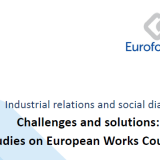
Sociālo partneru attiecības
Darba tiesisko attiecību pārvaldībā svarīga nozīme ir gan arodbiedrībām un darba devēju organizācijām, gan publiskajām iestādēm. Tās ir savstarpēji saistītas vienas sistēmas daļas, kura darbojas Eiropas, valstu, nozaru, reģionālā un uzņēmumu līmenī. Pēdējos gados, tehnoloģijām un darba veidiem attīstoties pastāvīgi mainīgos ekonomikas apstākļos, sociālo partneru attiecību sistēmas ir saskārušās ar būtiskām problēmām.
Šajā kontekstā Eiropas Komisija 2015. gadā nāca klajā ar jaunu sākumu Eiropas sociālajam dialogam. Komisija, Eiropas Savienības Padome un sociālie partneri 2016. gada jūnijā parakstīja kopīgu paziņojumu, kurā uzsvērts, ka sociālajam dialogam kā svarīgai sastāvdaļai ir liela nozīme ES nodarbinātības un sociālās politikas veidošanā.
- Eiropas Komisija: kopīgs paziņojums par jaunu sākumu sociālajam dialogam





























